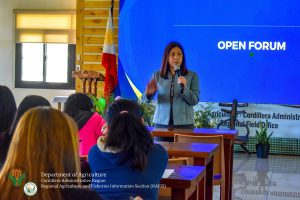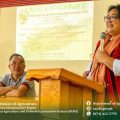 At least forty (40) employees of the Department of Agriculture – Cordillera (DA-CAR) were upskilled on financial capacity and management through the Financial Literacy Seminar. This was held on March 16, 2023 at BPI Compound, Guisad, Baguio City, in line with the 2023 Women’s Month celebration.
At least forty (40) employees of the Department of Agriculture – Cordillera (DA-CAR) were upskilled on financial capacity and management through the Financial Literacy Seminar. This was held on March 16, 2023 at BPI Compound, Guisad, Baguio City, in line with the 2023 Women’s Month celebration.Topics tackled in the seminar included financial planning, saving and interest, budgeting, and investing. Rodora R. Openiano of the Bangko Sentral ng Pilipinas (BSP) North Luzon Regional Office, differentiated saving and investing. Accordingly, saving is to be liquid and to meet a specific goal including buying a house, a car, and such. Investing, on the other hand, is to earn a return and to build wealth. She said that a person must never invest without savings, but can save to invest. “Everyone has money, it only depends on priorities,” she iterated. Additionally, people need to invest because over time, the value of money does not have the same worth.
She also advised the participants to first know one’s risk appetite before investing. As per the risk-return principle, the higher the return, the higher the risk and the lower the risk, the lower the return.
Accordingly, 64% of Filipinos do not invest. Based on the BSP Financial Inclusion Survey, the top reasons why people do not invest were lack of money for investment, expensive investment, lack of awareness on investment, and its necessity to a person.
Furthermore, prioritization is the most important aspect of saving and budgeting, which can be achieved through financial planning and budgeting techniques as per the survey. Hence, the BSP underscored the importance of financial planning, as planning can help a person control their overspending, secure from risk [of unnecessary loss of money], have freedom from worry and debt, have a sustainable lifestyle, and realize goals.
 With this, a new formula known as Reverse Budgeting was introduced. Instead of deducting expenses from income like usual, savings must be deducted first, and budget the remaining fund for expenses. Other budgeting techniques are the Balanced Budgeting of 50/30/20 Rule, in which a person allots 50% for needs, 30% for wants, and 20% for savings; and the Envelope Budgeting or a strict allotment of cash per spending category.
With this, a new formula known as Reverse Budgeting was introduced. Instead of deducting expenses from income like usual, savings must be deducted first, and budget the remaining fund for expenses. Other budgeting techniques are the Balanced Budgeting of 50/30/20 Rule, in which a person allots 50% for needs, 30% for wants, and 20% for savings; and the Envelope Budgeting or a strict allotment of cash per spending category.Cherry Renee Pongco, another representative of BSP, reminded the participants to always have a financial plan to be able to save and ensure preparedness for life events, especially during unexpected times. “Parents, your children are not your retirement plan. Children, your parents are not your emergency fund,” she emphasized.
Managing Director of World Financial Marketing Alliance, Inc. Wilfreda Flores also discussed Financial Stewardship for the employees to be wisely responsible for their financial resources management and protection through execution with integrity and ethical conduct. These financial resources include time, money, people, and property.
She further emphasized the importance of financial literacy for a person to be a good steward of his or her money. “We are financially grounded if we are good stewards of our money. We are not distracted or in panic when difficult times strike,” she said, adding that everyone must live within their means, and to have an alternative source of income.
Moreover, she presented the X-curve theory, or the Law of decreasing responsibility and Law of building wealth, the rule of 72, and the wealth formula. She also discussed the Variable Unit Link (VUL) Insurance or the combination of life insurance and investment. VUL is a hybrid product that is being offered by insurance companies.
From the takeaways, Janine Loyesen from the Budget Section stressed that people should realize that it is the spending habits that must be taken into account on why people are having a hard time on saving money. “We always wonder where our money went without considering our spending habit. Hence, we must control and maintain our spending habits in the future,” she stressed.// CEWaytan






